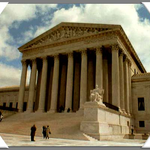General Information
UPDATE: On June 28, 2004 the U.S. Supreme Court granted Thomas Miller-El certiorari a second time (MILLER-EL v. DRETKE, No. 03 – 9659), in order to address whether the U.S. Court of Appeals for the 5th Circuit again erred in reviewing Miller-El’s claim that the posecution purposefully excluded African Americans from his capital jury, in violation of Batson v. Kentucky. Arguments were heard in November 2004 and the case was decided on June 13, 2005 in Miller-El’s favor. Prosecutors announced in July 2005 that they would seek a new trial. A summary of the Court’s opinion follows:
In a 6 – 3 decision, the Supreme Court ruled that Thomas Miller-El, a Texas death row inmate, is entitled to a new trial in light of strong evidence of racial bias during jury selection at his original trial. In choosing a jury to try Miller-El, a black defendant, prosecutors struck 10 of the 11 qualified black panelists. The Supreme Court said the prosecutors’ chosen race-neutral reasons for the strikes do not hold up and are so far at odds with the evidence that pretext is the fair conclusion. The selection process was replete with evidence that prosecutors were selecting and rejecting potential jurors because of race. And the prosecutors took their cues from a manual on jury selection with an emphasis on race.
Justice Souter, writing for the majority, set out the evidence that race governed who was allowed on the jury, including: disparate questioning of white and black jurors, jury shuffling, a culture of bias within the prosecutor’s office, and the fact that the prosecutor’s race-neutral explanations for the strikes were so far at odds with the evidence that the explanations themselves indicate discriminatory intent.
In 2002, Miller-El had previously petitioned the federal courts to enforce the rule of Batson v. Kentucky, which prohibits racial discrimination in the exercise of peremptory challenges in jury selection. The federal District Court denied him habeas relief and the Fifth Circuit ruled that there were no appealable issues, and denied a certificate of appealability.
In 2003, the Supreme Court reversed, finding that reasonable jurists could differ on whether Miller-El had appealable issues and ordered that the Fifth Circuit to grant a certificate of appealability to further review the case (Miller-El v. Cockrell, 537 U. S. 322 (2003)). The Court, in an 8 – 1 opinion, criticized the Fifth Circuit’s “dismissive and strained interpretation” of critical facts and ruled that the lower court’s refusal to consider Miller-El’s Batson claim was based upon a standard of review that was too demanding. On remand, the Fifth Circuit held that Miller-El failed to show by clear and convincing evidence that the state court’s finding of no discrimination was wrong, whether his evidence was viewed collectively or separately.
The Supreme Court reversed again. Because this was a habeas corpus proceeding, the Court needed to find that the state court’s interpretation of the facts was unreasonable under the Anti-Terrorism and Effective Death Penalty Act of 1996. The Court stated that the Texas courts finding of no discrimination “blinks reality,” and was both unreasonable and erroneous, reversing the Fifth Circuit, and granting Miller-El habeas relief and a new trial. (See Associated Press, June 13, 2005). Read the complete decision. To view a video about the Miller-El case, click here.

Earlier Miller-El Case
On February 25, 2003, the U.S. Supreme Court issued an 8 – 1 decision in favor of Thomas Miller-El, a Texas death row inmate who claimed that Dallas County prosecutors engaged in racially biased jury selection at the time of his trial in 1986. The Court ruled in Miller-El v. Cockrell that Miller-El should have been given an opportunity to present evidence of racial bias during his federal appeal. The Court sent the case back to a lower court, where Miller-El could be granted a new hearing on his claims. “Irrespective of whether the evidence could prove sufficient to support a charge of systematic exclusion of African-Americans, it reveals that the culture of the district attorney’s office in the past was suffused with bias against African-Americans in jury selections,” Justice Anthony M. Kennedy wrote. (Associated Press, February 25, 2003) Read the opinion.
Miller-El asserts that Dallas County prosecutors systematically excluded African-American jurors during his trial. Ten of the 11 potential black jurors were eliminated by the prosecution. In their final analysis, the lower courts discounted evidence that, until at least the mid-1980s, prosecutors employed a policy of removing as many black jurors as possible from trials of black defendants.
In its 1986 ruling in Batson v. Kentucky, the U.S. Supreme Court reaffirmed that it is unconstitutional to strike jurors solely on the basis of race and put a greater burden on the state to show that it was not engaging in such behavior. Prior to this decision, prosecutors did not have to provide a reason for striking potential jurors. This opinion was issued one month after Thomas Miller-El was convicted and sentenced to death, but applied retroactively to his case because his sentence was still on direct appeal. In Miller-El v. Cockrell, the Justices will examine whether the lower courts’ failure to examine Dallas County’s history of racial discrimination in conjunction with the prosecutorial strikes in Miller-El’s case was proper.
Legal Links to Miller-El v. Cockrell And Miller-El v. Dretke
Read the second Supreme Court opinion (2005)
From the first case:
Read the Supreme Court opinion (2003)
Read the Fifth Circuit Opinion (2003)
Read the Petitioner’s Brief
Read the Respondent’s Brief
Read the Amicus Curiae Brief of The Honorable Arlin M. Adams and Julie R. O’Sullivan
Read the Amicus Curiae Brief of The NAACP Legal Defense and Educational Fund
Additional Resources
DPIC PRESS RELEASE: SUPREME COURT TO HEAR ARGUMENTS IN TEXAS DEATH PENALTY CASE ON RACIALLY BIASED JURY SELECTION
To view a video about the Miller-El case, click here.